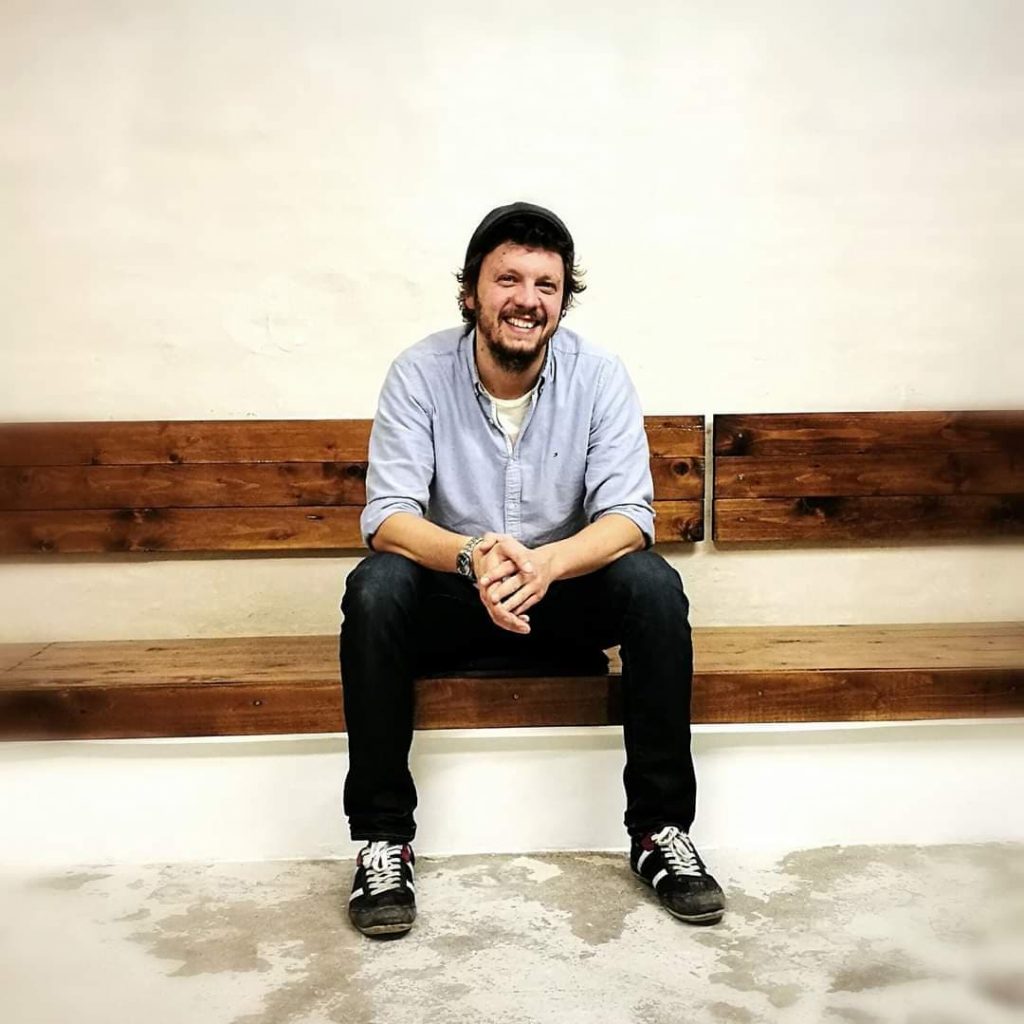The phone rang. Nerves built up as always when calling a new interviewee.
“Hi, Balázs speaking, Kompasset Ølbar” went the voice on the other end. Good English and a medium-strong Hungarian accent.
“Hey Balázs, this is Biró Soma speaking …” I said in Hungarian (hence the family name first).
“Soma! Hey! How have you been!?” he said, much to my surprise.
“Do we know each other?” I asked after a short pause, my mind racing to locate the time and place we might have met before.
“I don’t think so,” he answered casually. I started laughing and he continued: “But I like to greet people this way.”
“Alright, thank you. I got surprised there for a moment, thinking ‘how could this be’?”
Now he laughed.
“So, I’m a journalist at The Copenhagen Post and”
“I know one of your co-workers! The guy loves quizzes, he’s British. Wait, don’t tell me, what’s his name? I’ll tell you in a second … Not Benja … min. Benjamin?”
“Almost, almost. The short version.”
“Benjy!?”
“No. Even shorter.”
“Beny… Ben! Ben!”
“Yes!”
“I don’t know why I’m guessing Benjamin … that was my strong first instinct for some reason.”
You see, I first discovered the Østerbro bar Kompasset (Østerbrogade 103, Cph Ø) because my editor, Ben Hamilton, invited me to fill a spot on his team bound for the traditional Wednesday night pub quiz. The owner, Balázs Szilágyi, has a habit of including quite a few Central and Eastern Europe-related questions, so Ben thought his Hungarian journalist might be of help on the quest to win it all.
In the end, my editor’s team didn’t land a table that night and I haven’t been to Kompasset yet. And now I couldn’t go even if I wanted to. Kompasset shut down on Wednesday March 18 following the press conference that saw Mette Frederiksen announce the closure of all bars and restaurants in Denmark due to the coronavirus pandemic. They’ve been closed a month and they might not be allowed to reopen until May 10 at the earliest.
Like many others, Kompasset was hard hit. The number of customers had already halved during the week leading up to the press conference and, having asked Balázs whether the the gap between their pre and post-shutdown revenue was big, he replied: “Very. It’s very, very big. This is survival mode right now. We lost about 76 percent of our income.”
The remaining 24 percent has been retained thanks to an entirely new business model.
Reimagining Kompasset
“Look, I didn’t sleep a second of the night of the announcement and the following night either. I had no idea what’s going on. Really. I had no Plan B in mind at that point. It was terrible. You feel the responsibility to your employees, co-workers, customers. We decided not to give up completely. So, during those two sleepless nights and days we had to come up with a new plan.”
And they – Balázs and his French-Canadian business partner, Michel Dziadul – did just that with a two-part plan. The first part offers takeaway and delivery options. Kompasset delivers to your door if you order for a minimum of 450 kroner (the equivalent of 10 bottles of beer), or else you can go to the bar yourself and spend as much as you please: “So, if someone only wants a can of beer, we’ll sell it to them. They can come down and pick it up.”
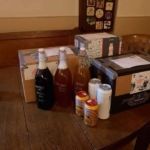
This completely upended Balázs’s everyday life: “Never in my wildest dreams had I imagined that I would become a delivery boy. I manage a pub, that’s where my experiences lie – I belong behind the bar, I thrive there, joking with customers all the time, and I probably won’t have this back for some time. We’ve entered a completely new world.”
Balázs wakes up at around 8:30, does some administration and takes orders. Then he delivers in the afternoon. “People contact me by phone, WhatsApp, Facebook, Viber … they reach me in many different ways, and I take orders between about ten and two. From two o’clock until four, I go out and collect the bottles we delivered two days ago, take them back to the pub, collect new orders and go back out there to deliver.”
Yes, you heard it right, it’s the sound of sustainability: “We still sell draft beer, which we deliver in one-litre flip-top bottles. These are the bottles we collect again in about two days, disinfect and reuse. I take 20 kroner in deposit for these, which I return immediately after I pick them up again. We’re trying to be as sustainable as possible.” But that’s not the end of Kompasset’s planet-friendly behaviour. Let’s not forget about the boxes the bottles are transported in: “Sometimes we buy these cardboard boxes from Inco, but we can also get some from Netto, where they’re throwing a lot of them away and we can just reuse them.”
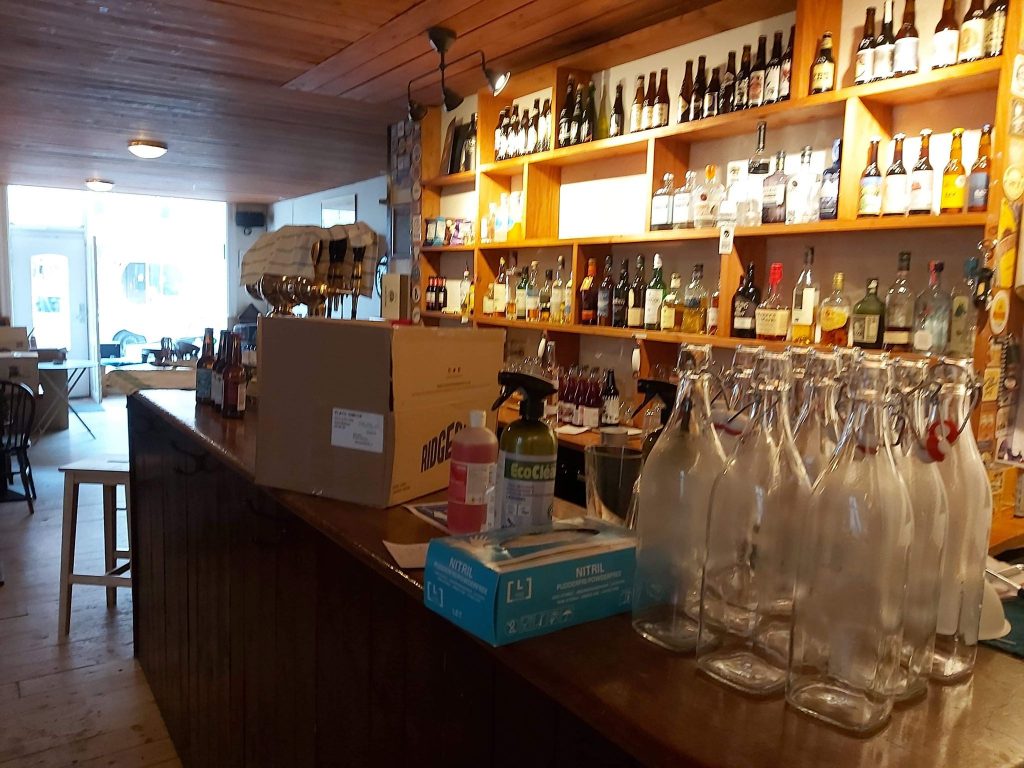
The magic number
If you’re into craft beer, here’s a corona upside for you: thanks to Kompasset’s new business model, you’ll get all their beers for 45 kroner now, even the ones that used to cost 75 or 80 before: “Obviously it’s cheaper to buy beer in the kiosk than in a pub. So we tried to adjust prices so that they fall between the two. Because, if you go into a bar, the bartender taps the beer for you and that’s a service, and there are other expenses to think of: rent, employees, the cost of procuring the items we’re selling (foreign craft beer you don’t find in Netto), etc. So a lot goes into the price of a beer, but now that we deliver, we cut some costs, such as employees, and can bring that price down.”
“It’s blowing my eyeballs out of their sockets”
A violent wind slaps his face red as he rides the Christiania bike through the city. “Fuck” is the only word echoing in his mind. He places his left hand in the air, takes a quick glance behind him to ensure nobody’s about to cause an accident, pulls over and jumps off the bike. A quick breather. Then, Balázs lifts a large box out of the cargo and prays that the fast approaching runner, struggling to keep a straight line, doesn’t lose her balance and break all ten bottles … or infect him with coronavirus. The runner passes and Balázs places the box in front of the entrance door. He steps back about two metres, reaches for his phone and makes a call: “Hey, it’s Balázs, I have your beer ready downstairs.” This is approximately how a Kompasset delivery looks like. Also, customers pay through MobilePay: “I do what I can to limit personal contact as much as possible.”

As a bartender at heart, conversations are not entirely banished from the process: “I have a few customers who I have known for a very long time, for years, or they’re Hungarian, and we start chatting. I have to keep delivering so it’s not like we sit down and have a beer together for two hours. We condense into 10 minutes all that we’d otherwise discuss for three hours in the pub while drinking together. But I feel lucky even like this – at least I get to meet with my friends.” Note that Balázs calls his customers friends. “It might only be for five minutes, but at least I still get to meet with them in person. It’s good for my social life. Some can only do it online these days.” Currently, Balázs receives between five and ten orders a day.
“So, without further ado, let’s start our quiz with the first question …”
“What is the smallest state in the US?” says Balázs into his laptop to an audience made up of teams like U-are-a-quizard-Harry, Østerbronx, Justifiable-bitters and Once-I-Putin-I-never-pull-out, among others.
Indeed, the second important component of the new business plan is the quiz. The Wednesday night quiz at Kompasset was quite popular before the virus: in the past year, it was fully booked each and every week for six weeks in advance. So Balázs decided to move it online. He livestreams it himself, presenting the questions on Facebook, giving teams about three minutes to come up with an answer and write it into their Google answer sheets.
“Which city is known as the Jerusalem of Europe? Who is the lead actor in the 1989 movie ‘Field of Dreams’?” he continues.

Once Balázs receives all the answer sheets, he disappears to correct them before resurfacing to crown a winner and reveal the correct answer to each question. The quiz also includes a beer round: a game within the game that doesn’t afford teams any points but secures the winners a round of drinks on Balázs, once Kompasset reopens again.
“The first question of the beer round is one in which you have a 50 percent chance of getting it right,” reveals Balázs. “Half or two thirds of the teams usually get it right and go on to the second question, which is a tiebreaker that asks for a number: what is the distance between Zagreb and Belgrade in miles and bee line? How many people did John Rambo kill while half-naked in all five Rambo movies? Everyone guesses and the team closest to the right answer wins the round.”
Otherwise there is a general knowledge part, a music part and another section split into three different topics that vary each time. The first attempt went pretty well, bringing nine teams to the virtual arena: “For the first online quiz, I personally reached out to our regular quizzers – who used to participate in the pub every week – and told them about the idea, but only them. They were very nice, and they were all up for it.”
A sweeping success
Then, on the second week, it exploded: “We had a record number of 24 teams.” This was way more than the highest number of teams ever accommodated by Kompasset before the coronavirus: “We can only fit a maximum of 15 teams in the pub any given Wednesday, which is about 55 people.” With an average of four people on each team, the second online quiz had approximately 100 people joining in. The new quiz was a hit. It gives people something to do on a quarantined Wednesday night and, key in this entire operation, it actually brings in the dough – to participate in the quiz, each team must buy beer, some other alcoholic beverages on offer (such as cider, vodka, gin and Unicum [a Hungarian herbal liquor]) or a gift card for at least 450 kroner. The third week, the number of teams fell to 23, but a week later it hit an all-time high of 26.
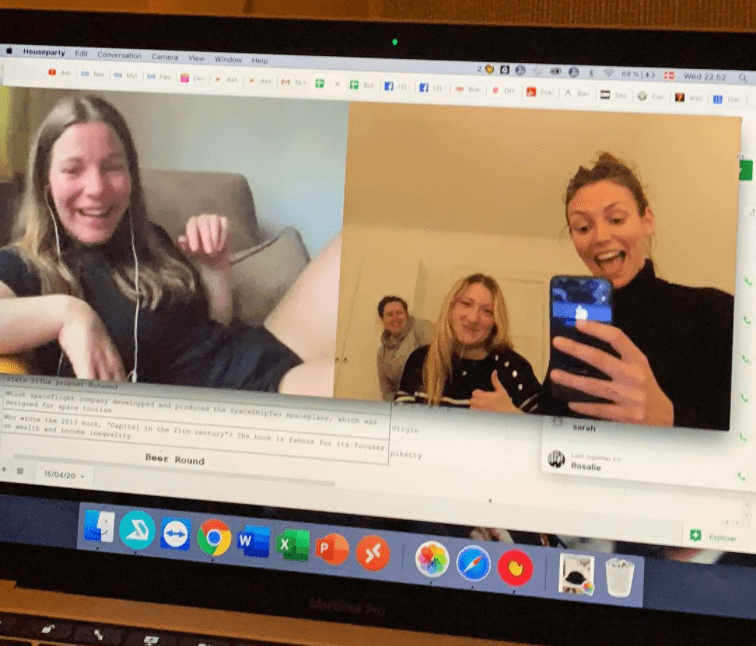
The quiz also spreads the word about Kompasset, inviting new customers to give its Peated Ale (smoked beer) or Red Sails (double IPA) a try. “On week two, beyond the nine regular teams, we also had the quizzers who usually only take part on occasion and wanted to be in on it this time. So I was familiar with about 20 teams and the remaining four or five were new – made up of people I’ve never met before. On the other hand, I meet a lot of people and I don’t remember everybody,” said Balázs. “But yes, we might be able to gain some promotional benefit from the quiz.”
The KQL — Kompasset Quiz League
You can also choose to become part of the quiz league, which consists of four seasons of three months each. If you win the current Spring League, for example, you’ll attain the grand prize of a 500 kroner gift card to Kompasset. Teams who become league players receive three points for each quiz won, two points if they come in second, and one point just for participating in a Wednesday night quiz.
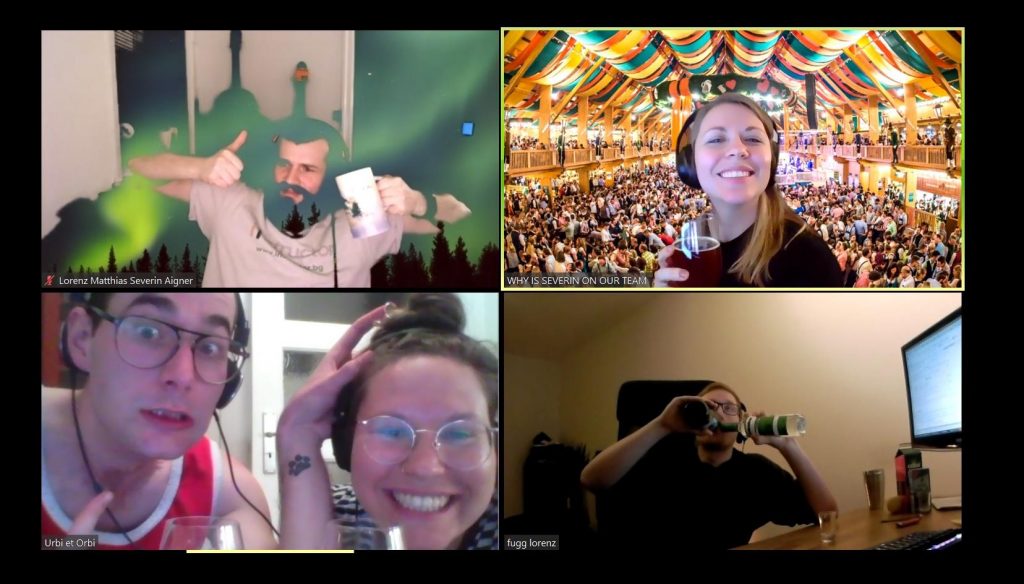
A blockbuster in the making?
Perhaps in the future, Kompasset will be a household name with a popular, gigantic quiz: a group of participants lucky enough to land a table will sit inside the bar while a myriad of others follow live in front of their computers, drinking Hibiscus Rouge as Balázs announces the questions to an audience of hundreds, thousands, let’s dream big, hundreds of thousands, happy knowing that this means he delivered at least ten bottles of beer to each and every remote team before the event. And now, during the show, many more are ordering, laughing, flirting and drinking in the pub. He’ll be wearing a tuxedo, an expensive one, one of the richest pub owners in town. All a result of the coronavirus and two sleepless nights.
But this is just the journalist guessing. Perhaps it would all go to hell when people found out everyone doing the quiz online was getting their answers from Google. Who knows. But, for now, Balázs doesn’t reject the idea: “If there’ll be a demand, if we’ll still have 20 teams interested and willing to order to participate, then we’ll definitely consider keeping it going. And we might move it to Sunday, when people are sitting at home anyway.” Until the big time, catch Balázs in a white (or black) shirt in front of a white wall, reading out questions into his six-year-old MacBook … at home.
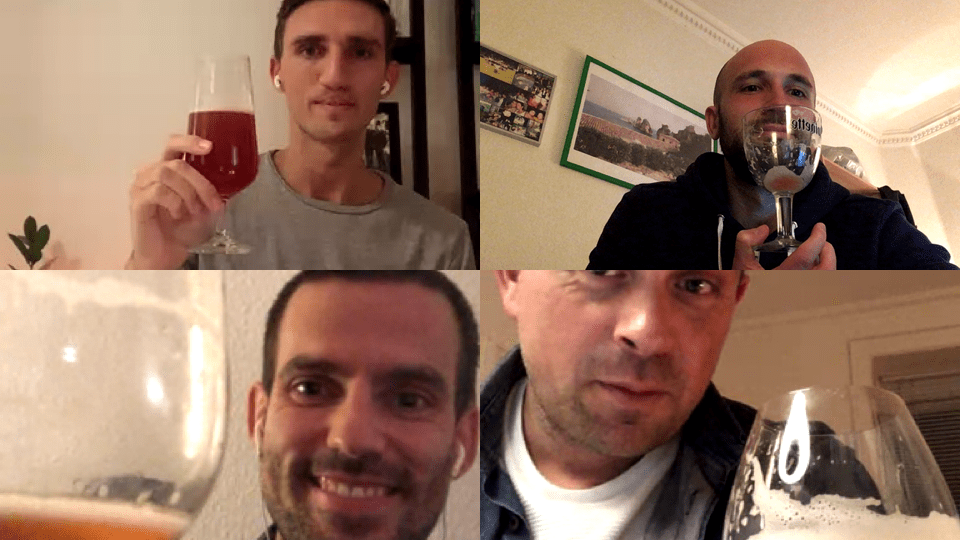
Rainy day fund
With the new business model, Kompasset seems to be set to survive for quite a while despite making only a fraction of its usual revenue. Another reason for this is a combination of luck and a smart financial decision: Balázs and Mike saved up some money before the outbreak – enough to keep everything afloat for about two months, even in the case of a complete shutdown during which no business could be conducted. “Luckily business has been quite good leading up to the virus, which allowed us to put some money aside. This is largely because our high season lasts from November to March: we are an indoors pub, you can’t sit outside here. So when the weather’s bad, that’s good for us – people want to be inside while having a beer. Had the virus come in September, I would’ve broken down crying.” They originally wanted to use the money to invest but are now saving it for survival. But as long as they can keep delivering and offering takeaway, they can keep postponing the need to start using that money.
So if the virus had to come, it came with near-perfect timing as far as Kompasset’s economy is concerned. Only near-perfect though, because Balázs told me that “March is our best month. We’re way past Christmas at this point, so people have some money to spend but the weather is still just bad enough to make them want to sit inside.” For now, Balázs and co are not in pressing need of government support and they are not receiving any, though they are looking into that option as well.

Skype meetings, software developers and the rent
The nature of Kompasset’s customer base is another buffer to the blow of the crisis. “Our guests are mostly expats and Østerbro locals. So the lack of tourists doesn’t affect us much. Tourism-driven places are completely dead now. We are in a better position because our clientele of returning customers is trying to help keep the business running by ordering beer from us. Almost all of them started working from home after the press conference that closed us: these people either work at the UN or they are software developers, or work at Saxo Bank or at a marketing firm. I’m talking about companies around Østerbro whose employees used to come down to Kompasset after work – they can’t do that now, but they’re still in the city, sitting at home and they can order from us. And beyond that, people have been organising Skype meetings with friends to have a few beers together and this is what we’ve become a supplier for. And I do feel that we also support social distancing by doing deliveries, because this way not everyone has to go to the store to buy their beer. Instead they can get it delivered by us.”
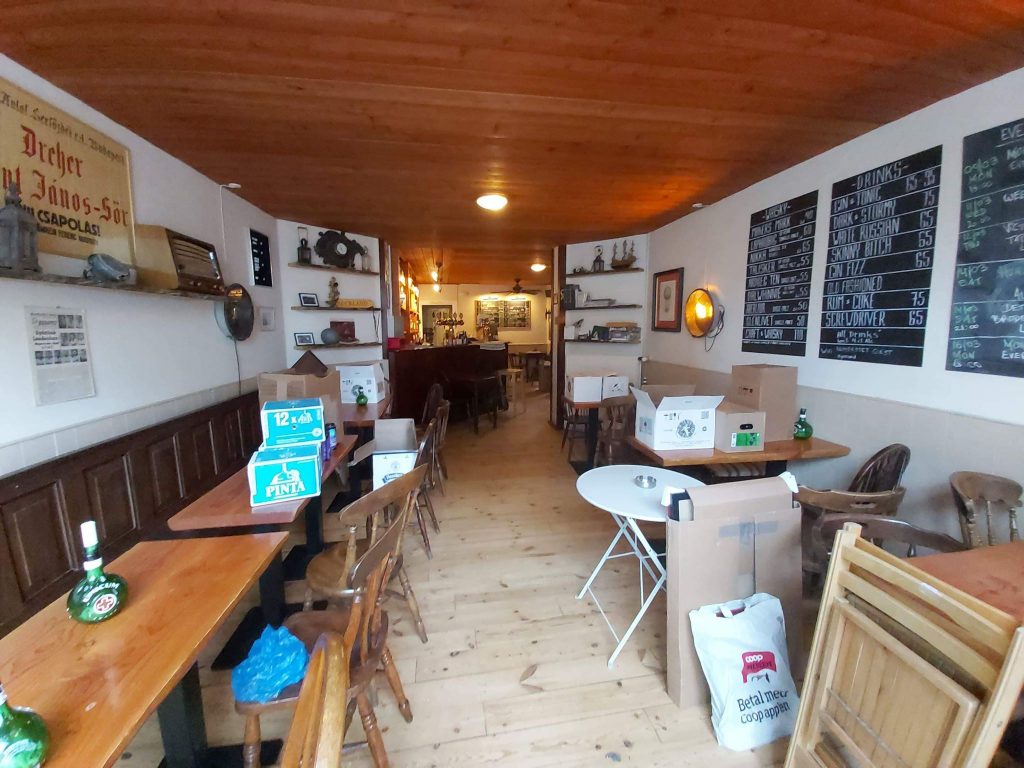
Another helpful aspect was the rent which, according to Balázs, is relatively expensive but payable – they are able to cover it from the 24 percent of remaining revenue. “But there are pubs in the inner city that have space for 150 people and their rents are astronomical. They also have full-time employees, and you must pay full-time employees even when you don’t have an income. We only have part-time.”
Uncertain times
Despite the relatively successful survival mode, there are still many uncertainties ahead: “We don’t know how many customers we’ll have once this shit show is over. Or what kind of restrictions there’ll be as pertains to going to pubs and restaurants. We don’t see the end of it and this is quite frustrating for me. But my business partner, Mike, he seems pretty relaxed. He’s always positive … you know, he has that French-Canadian blood in him – a proud Quebecer. He just goes: ‘Well, look, what’ll happen will happen.’ Me, with my Central, Eastern European mentality, I’m nervous of course.” I laughed at the other end of the line before Balázs added: “What we brought from our roots is probably different from what he did.”
“Yes, yes” I replied. “Unfortunately sometimes it’s hard to shed this tendency to focus on the negative side of things.”
“There’s a travel company in Østerbro, for example, which got rid of most of its employees due to the collapse of the tourism industry. This is quite bad for us as we had a good number of customers from there: people who always came down for beer after work. My girlfriend worked there too and she has also been let go. In the summer, our worst season, they were a big help because, being a tourism company, they didn’t go on holiday and employees kept visiting us. Until we open our doors again, we won’t know what effect the crisis has had on companies like this, how many have been fired, and how our regular customer base might change as a result. So we might be able to open come May 10, but we don’t know whether the usual turnover follows. I’ll probably have to do more bartending and won’t be able to give as much work to our part-timers.”
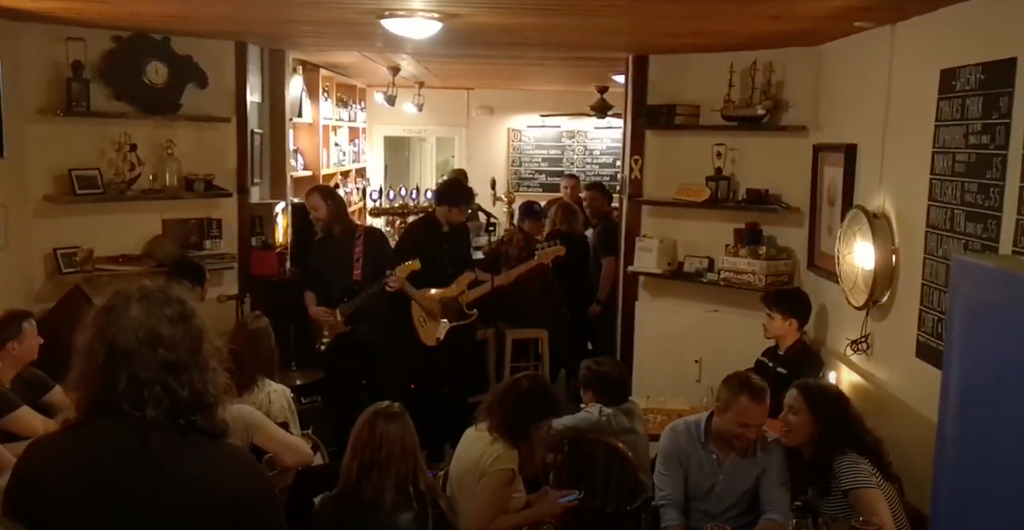
Waving goodbye to employees
Balázs first heard about a possible lockdown during the last in-bar quiz before the famous March 17 announcement. “One of our regulars came up to me – a Brit who himself owns a restaurant in Christianshavn – and he said: ‘Look man, we might need to shut down.’ I was a little surprised, you know, like ‘What are you talking about?’” It was March 11, the night of the press conference that shut down all educational institutions, libraries and sent non-essential public workers home. So the week before Kompasset was forced to close its doors, Balázs warned employees that he might not be able to pay them much longer.
Then, Kompasset’s troops were relieved of their duties (though not fired) with only the owners left serving on the front lines. “They were all part-time and unfortunately we can’t give them any work right now. And, as a result, a few of them are in quite a difficult situation – for example, because they are not EU citizens, so they’re here on a working visa, or they’ve been trying to get by on 20 hours of work per week in the hospitality industry. Or, there’s a Hungarian guy who studies here, and you know what kind of conditions are in store for you when you live on SU and don’t have that extra 12 hours of weekly income.”
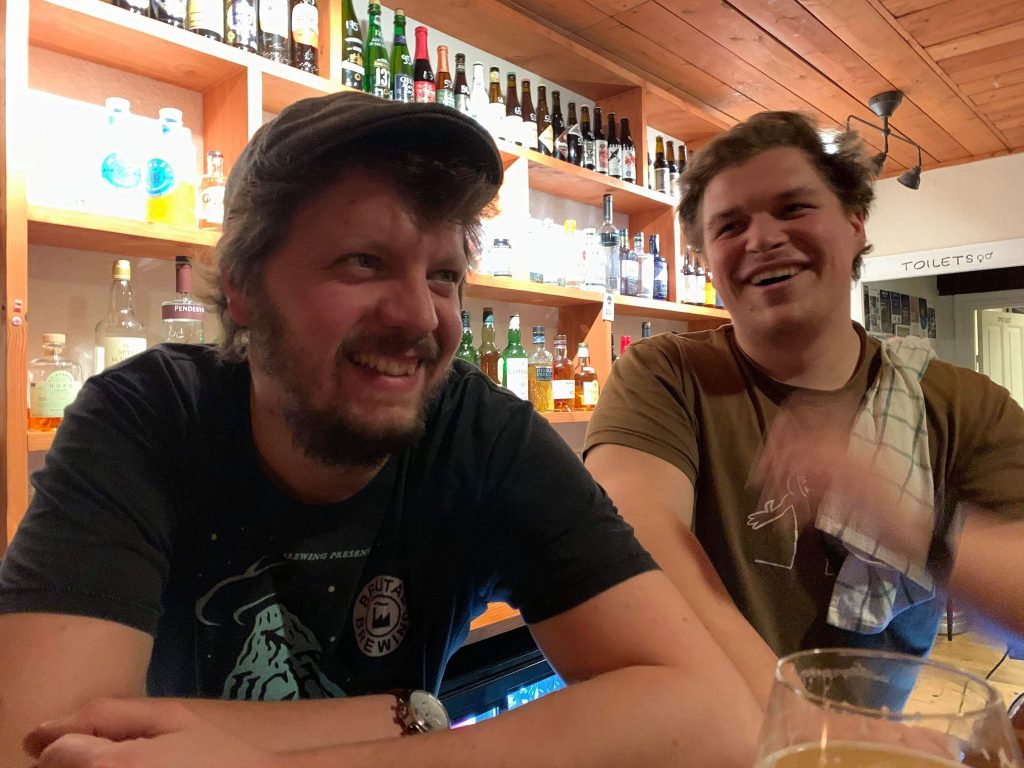
Quiz to the rescue
Here we circle back to those online quizzes: when Balázs receives 24 answer sheets with 32 answers on each, he’s having to look through 768 answers while his audience is holding their breath: “Let’s just say I had a smaller administrative challenge plus a minor stroke. Under regular circumstances, I spend 15 minutes going through the answers and counting the points. With 24 teams, it took me a good 40 minutes.”
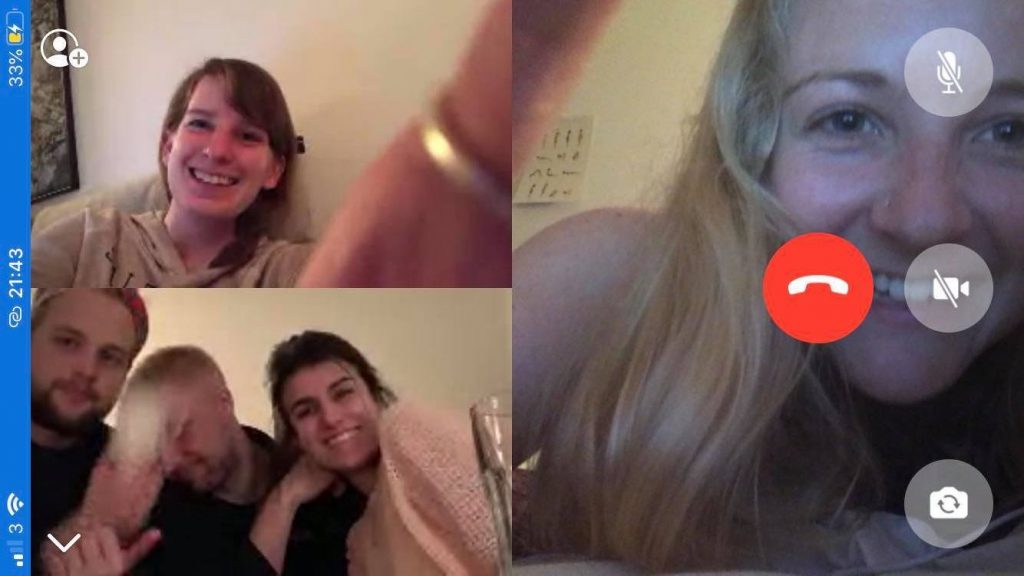
“It’s not good for me, because I could be doing other things, and it’s not nice for the audience either, having to wait 40 minutes in front of their computers to get the results.” Thus, delegating some of that work would be a big help: “One of our bartenders could take half of the teams and correct their answer sheets while I’d do the same with my batch and then I’d put it all together. I could assign three or four hours to an employee this way.” Balázs also told me that if the number of orders increase, he might be able to pay for some delivery work as well.
Or not
But things didn’t go as planned. Balázs did end up getting some help with the quizzes the week after he said the above, but not from any of his employees: “My girlfriend’s helping me out with that now.” As it turns out, it’s best for employees if Kompasset doesn’t start employing them now, Balázs explained. “What Mette said was that we can only ask for compensation if we’re not employing anybody so it looks like we won’t be doing that for now. The rule is that nobody can work, so that we can make a compensation package for our employees and obtain that compensation from the government. That is, if we don’t actively employ them but also don’t fire them. So we are going with this option. It means we’ll continue handling the distribution and the quiz by ourselves for now. Mike and I. And my girlfriend.” Thus, the delivery option also fell through, though order numbers have not increased anyway.
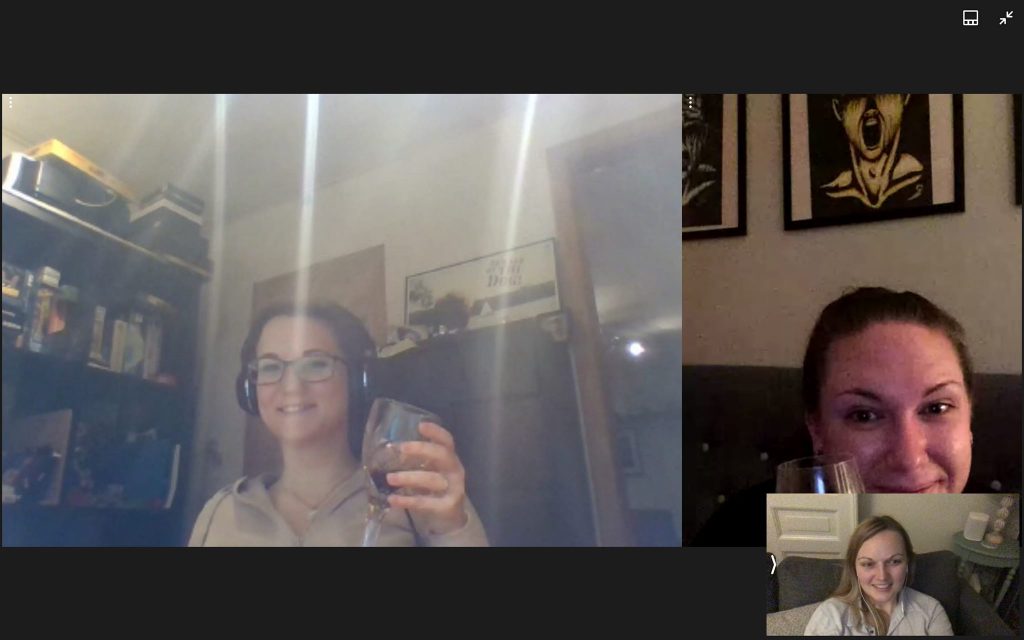
As per the latest update, Balázs and Mike have completed the papers and it looks like they will be able to pay their employees and get compensation from the government. For this past month of lockdown, they will pay employees the same amount they did in April – based on the number of hours employees put in that month.
You may now kiss the … wait
Naturally, Balázs’s life beyond the realm of Kompasset has also been affected by the virus. He was supposed to travel to Hungary just a day before our Friday morning conversation: “To attend my childhood best friend’s wedding. I was going to be his best man. Even the wedding has been cancelled. I still can’t quite grasp the situation completely.”
Another childhood friend, based in England, contracted the virus while suffering from asthma. “He had these coughing bouts, in between which he was choking. But he’s only 34 so his treatment was staying at home because the NHS [National Health Service] in England was completely strained. So he was trying to make it through on steroids… they help him breathe.” But things are looking up for the guy as he told Balázs he’s already on his way out of it – the worst stretch having been three days when he couldn’t sleep due to the coughing fits.
A family far, far away
Balázs is the only one in his family who lives abroad, so Mom, Dad and his older brother are all going through the pandemic in Hungary, where the virus has infected 1,458 people and claimed 109 lives at the time of writing. “I left Hungary when I was 22, so they are used to not having me around very much, but it’s important for me to go home eight or nine times a year for long weekends, and I haven’t been able to go back so far this year.”
“It’s quite frustrating. I love Hungary and I really miss my family … I hope they miss me too. And it’s hard not to know when I’ll be able to go back home again. So I always have this ‘What the fuck!?’ in the back of my mind. My father’s birthday was on April 2, for example. I’m missing things I didn’t think I would.”
How’re the folks doin’?
Balázs’s father is an entrepreneur who keeps his eggs in quite a few different baskets. He’s developing a payroll accounting software, exporting flour to Székely Land in Romania and in real estate in Budapest. With the virus, he can’t export flour anymore because Hungary is holding onto its flour for bread production, but he keeps busy with the software development. “And my mother, she works at Pro-M: it’s a state owned telecommunications company that provides a closed radio communications system for the ambulance services, police and the military – because obviously the military’s not gonna use Telenor for its communications.” She too is working from home now: unusual practice as she had always needed to be in the office e.g to attend meetings, Balázs explained. “So it’s weird for them too. But they’re trying to take it easy, and luckily they don’t believe everything they read on Facebook. Also, they don’t have a room full of toilet paper.”
Balázs’s brother, who’s an SAP super user at a multinational firm (I know, we’ll get to what that means in a moment) suffered a similar fate. Before the virus struck, “he was absolutely living the hip life in Budapest. He works at Honeywell, which buys smaller companies up and introduces SAP [an enterprise resource planning software] to them. SAP can be used in logistics, payroll accounting, finance and many other fields.” The man travels a lot, Balázs told me, so if they buy a company in Toronto and implement SAP, he goes there and teaches them how to use it. However, Covid-19 has resulted in the cancellation of all his trips and, for now, he is stuck at home like the rest of the Szilágyi family.
Go get ‘em, son!
“They are a very supportive family. I’ve lucked out with ‘em. Whatever stupid idea I have had, they’ve always stood by me and it’s the same now. They’re telling me I should just keep pursuing this new business plan – at least I have something to do. I occupy myself instead of sitting at home and pulling my nails off my fingers or something.”
“I’m the kind of person who always needs to be active. I don’t like staying at home and not being able to let myself loose. So it does a lot of good for my personal mental hygiene that I can keep busy with the deliveries and the quiz.”
It’s ten letters, starts with a Q and rhymes with clementine
As for more vulnerable family members, Balázs has a grandmother living in a small town in Békés County, Hungary. “Luckily for us, she doesn’t like going out anyway, so she’s fine with staying inside. She’s 82 years old and fit as a fiddle. She bikes, for example. So I hope she doesn’t get infected, but she really is a stay-at-home, crossword-solving grandma.”
I laughed in recognition, replying: “I know it well! Mine loves those crossword puzzles too.”
“Yes, yes. For me it’s really easy to buy Christmas presents, I just buy her a book full of crosswords. Granny loves it.”
A little politics
Regarding the Hungarian government, Balázs thinks it should take inspiration from the Slovenian response to the virus: “Slovenia doubled the wages of its health workers by subtracting from the wages of its politicians – we’re talking about outrageously rich people here. The Hungarian government could do the same. This would be telling people: ‘Yes, we care about you. We’ll support you at our own expense.’ I think the Slovenian government did a very good job communicating this.”
“But the problem is that I’m a barkeeper so I don’t usually express my political opinions because I don’t care about politics when it comes to others. I don’t make decisions about people based on that – just because someone has a different opinion, it doesn’t make them a bad or a good person. Even in the family we have different viewpoints, but they’re still my family, so I don’t judge based on that. Rather, I try to avoid political discussions.”
PART TWO:
I know what you’re thinking: this story leaves some big questions unanswered. Who is Balázs really? I mean, where did he grow up and what led him to Denmark? What was he doing in Scotland, who was he dating in Kolding and why did he move to Iceland for three months before taking over the helm at Kompasset? This is exactly why we need a Part 2 and it’s gonna be a long one.
The first part chronicles Balázs’s life pre-Kompasset, while the second (‘Business and Beer’) offers some insight into his entrepreneurial endeavours as well as his love of bitter, and the third (‘The Future’) takes a look at what lies ahead for this Hungarian expat.
BEGINNINGS:
The year was 1985. The place: Óbuda, Hungary. The man is born. “I grew up there, in Budapest, lived the life that 70 percent of Budapesters live.”
Having graduated from Budapest Business School in 2008 with a degree in economics, Balázs left the country the same year: “I could have started working in logistics and commerce at that point, but I decided I wasn’t going to begin this game called life yet and instead opted for travelling. And what’s the easiest source of income when travelling? Working behind a bar. At that point, I already had some experience since I was a bartender while studying in Hungary – at Sziget festival, in bars and restaurants.”
Thus, his travels began and they took him to Scotland first, where he ended up working for an entire year: “I worked in the Scottish Highlands, in the pub of a hotel with ten rooms. Their customers were basically tourists backpacking through a hiking rail. ‘West Highland Way’ it’s called. My manager told me it’s a 400-year-old military road that was originally created by the Stuarts for their soldiers when they attacked Scotland. They built a king’s house every 20 miles, where the king’s soldiers could rest for the night and have some beer. Many of these are still there today – they’ve become inns and bed and breakfast hotels. Most guests only stay for a night before hiking on. I lived in the small staff house next to the hotel, which was a big family house, an inn. There was also a house for the manager, one for the chef and one for the janitor. The closest sign of civilization was a petrol station 14 km away – that’s where I would buy my milk, bread and beer.”
It’s raining again – fuck this
“After a year, we were growing very tired of the fantastic weather and the six-day workweeks. So we decided good, okay, this is nice, but let’s make a change. It was around the time the financial crisis hit and we thought, okay, tourism is still holding up, so let’s stay in the same industry but move somewhere else. So I wrote to a friend of mine who was bartending in Malta, asking him: ‘Hey man, you guys have any work over there?’
‘Yeah, of course we do. Come on over!’
So we moved to Malta.”
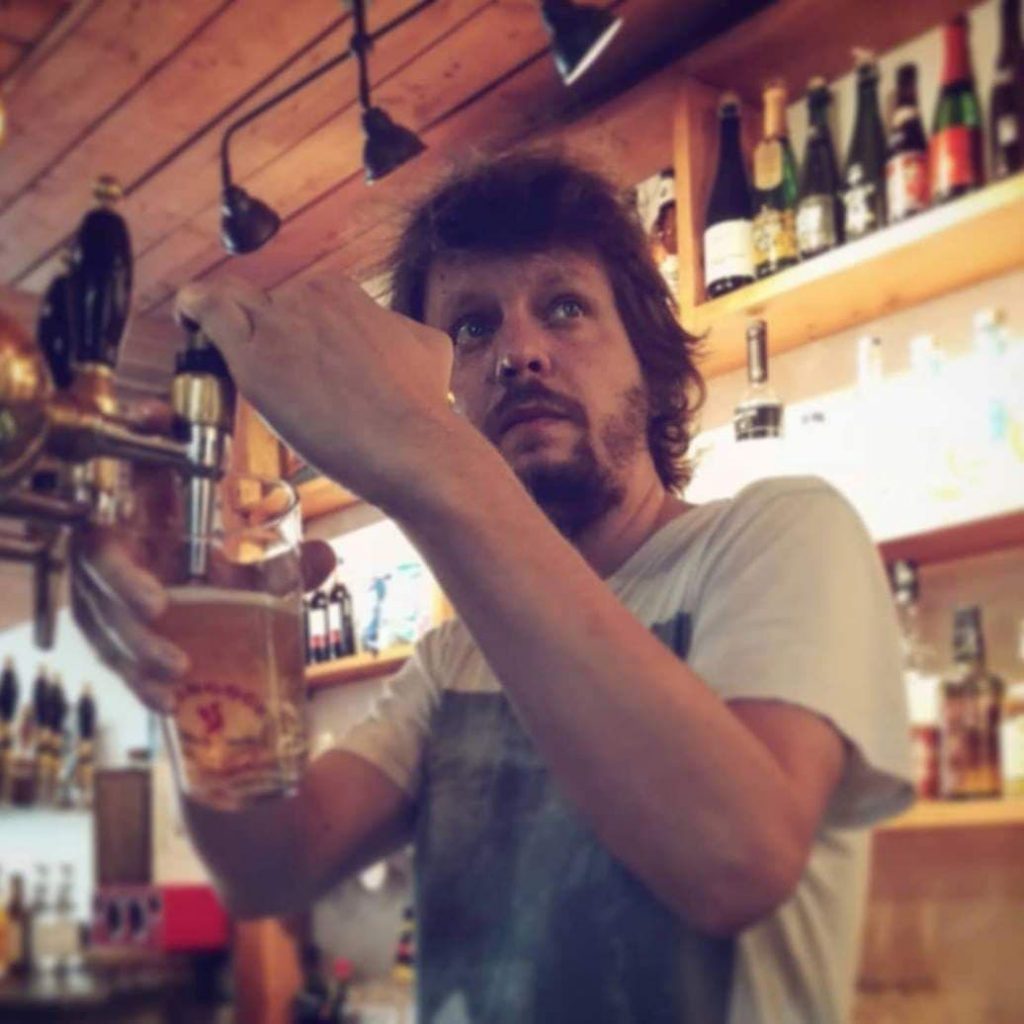
Balázs continued to hone his bartending skills in a hotel in Malta for a year and a half. “It was a tourist paradise where the worst temperature I’ve experienced was 25 degrees and the highest 48. Every night you went out you received some kind of brutally overwhelming impulse in the city. So it was a huge contrast to the Sottish lack of stimuli, especially in the high season. And it’s Malta, half the size of Budapest, so everything was close by. But that’s not to say that Scotland was bad: I learned a lot about whiskeys – knowledge I still use today. In Malta, I got more immersed in the world of cocktails and long drinks. And there was a lot of work – people probably worked 18 or 20 hours a day in the hospitality industry.”
Off-season and an unexpected encounter
The hotel in Malta closed for two months during the winter of 2009, so Balázs returned to Hungary for the break. He was on his way to have coffee with a friend one day when he discovered an educational exhibition at the Syma Sports and Conference Centre in Budapest, where his friend worked. “Since I was there already, I decided to check it out. This is how I met a representative from the International Business Academy, which is based in Kolding.”
Inspired by that conversation, Balázs and a good friend – the same guy who was with him in both Scotland and Malta – decided to continue their studies in Denmark. “But only after pulling off another season in Malta. We’re talking 2009, so Hungary didn’t exactly abound with employment opportunities. We thought: ‘Why not continue to study? And let’s see how Denmark is.’ It was only a one and a half year top-up bachelor degree in International Sales and Marketing Management to supplement our Hungarian BAs.”
So they moved to Kolding and their studies commenced in 2010.
Live and love in Kolding
While studying, Balázs worked and he also met someone: “That’s actually how I got stuck in Denmark the first time. Because of this girl. We were together for five years. Originally, my plan was to go to Ireland and work in a pub and maybe manage one eventually. Although, in hindsight, perhaps it’s for the best I didn’t bring sand to the beach.”
Balázs did cleaning, worked in a Lidl warehouse, and moved up the ladder to take charge of transport organisation in that Lidl after finishing his degree. “But then, for some reason, I realised logistics wasn’t going to be my future, so I quit and became a bartender again at You’ll Never Walk Alone – an English pub where I worked for four years.”
“My boss at that pub was very influential for me. Torben Matthews – he’s a big name in the Danish beer world. And it’s no secret that I often use methods I learned from watching him work. In 2013 or 14, he went looking for Hungarian craft beer. I joined him on his journey for a week: we were searching for small rural breweries in little towns. Obviously, those people didn’t speak anything but Hungarian, so I was the translator. I watched him negotiate with brewers, how he talks to suppliers, how much he orders, and so on. Also, the way he treated his employees: he always trusted me and gave me responsibility, which I always tried to repay by working in a way that was worthy of that trust. I know pub owners who, you know, struggle with complexes, shout at their employees and don’t pay them properly – those employees will have the same attitude towards the job, of course. If you treat your employees properly, they’ll treat their work the same way, and I think I learned this from him.”
In the meantime, Balázs also began to study web design – he enrolled at IBA once more to pursue a two-year degree in Multimedia Design and Communication. This lead him to Barcelona, where he spent half a year as an exchange student.
The city over them all
When Balázs came back from Spain, he moved to Copenhagen instead of Kolding. His relationship had ended by that time and there wasn’t much keeping him in the South Jutland city. The year was 2016: “I left my past behind in Kolding and started a web design job in CPH while working as a bartender on the side – in Kompasset. I didn’t know anybody, so I thought this would be a good way to socialise. It was also around this time that I met Mike, my current business partner. I was 30 at that point.”
“So things didn’t go well with that girl you dated in Kolding?” I inquired, looking for an explanation.
“No … no. We can put it like that, and that’s being very diplomatic.”
“You can tell me more if you’d like … I’m open to all stories,” I said, still laughing a bit at that last comment.
“No, look, I don’t want to expose her private life here. I still respect her and wish her all the best in life, but things didn’t go very well.”
“Is she Danish, by the way?”
“No, she’s Hungarian actually, from a small town in Székely Land [an area in Transylvania mostly inhabited by Hungarians]. I owe her a lot because my understanding of the situation of Transylvanian Hungarians has reached new heights and I made a lot of friends there as a result of our relationship. And I feel like I understand the problems faced by that Hungarian diaspora quite well.”
But back to business: Balázs’s employer at the time was Concept Makers, a small company that offers different design solutions. “Henrik, my boss – a great designer by the way – had about six projects that involved developing websites. I didn’t have to code from start to finish, but used templates, which made the job much easier. Also, we often worked in WordPress, building websites from the ground up in that system.”
Balázs had a six-month contract with them, which covered the time it took to complete his work on those projects. Once that expired, he was ready to pack up and leave again: he got a new web design job and moved to Iceland for three months in 2017. “But by that time, Mike and I already knew that we were going to be able to buy Kompasset that same year. We just needed a little more time to make the money. So I decided to go to Iceland and save up some over there.”
Coding in Iceland
Balázs developed three websites for a photo studio in Reykjavik. You’ve probably guessed and correctly so: Balázs was also back behind the bar, working in an Irish pub (called, surprise, Dubliners) in his free time. “I went into the city centre to have a beer on a Sunday morning, because I had nothing else to do, and I started talking to the bartender, who turned out to be the manager. It also turned out that he had an employee who hadn’t turned up to work for the fourth time that day. I told him I like bartending and, if he’d like, I could help out. So he went: ‘Alright, this’ll be your last beer then’ and I was standing behind the bar within the hour. It was very good for me because I met a lot of people who I was able to go travelling or hiking with – fellow bartenders and customers even. And the web design job was quite flexible – my boss only wanted me to be in the office once or twice a week, so I could work remotely for the most part.”
After those three months, Balázs came back to Copenhagen and took over Kompasset, which thus opened with a new owner on 5 September 2017.
BUSINESS AND BEER:
History of Kompasset
The concept and the brand of Kompasset was created by a British man named Andy Chappell, who originally opened the bar. He was a sailor on the Atlantic for 30 years before retiring and embarking upon a quest to create a British maritime style pub in Copenhagen: Kompasset.
“He lives between Denmark and the UK. He ran Kompasset for 11 months before selling it to us after realising that he belongs at sea – he went back to England to work as a skipper. He has a ship on the Irish Sea and he takes these maintenance workers or technicians to and from the wind turbines. He’s a very nice person, by the way.”
Entrepreneurs
Balázs’s business partner opened Gorki Café-Bar (Nansensgade 26, Cph K) long before they acquired Kompasset. He started Gorki in 2015. “It’s a very tiny little pub. That’s where I met Mike. We became good friends and, after Kompasset came on the market, we decided to start a company together. The idea was that we would each be responsible for one bar under this company. We needed some more funding, so we also found a silent partner who holds a certain percentage – a Danish guy. He’s very useful now that we need to find our way through this bureaucratic cavalcade and figure out who’s eligible for government support and to what extent.”
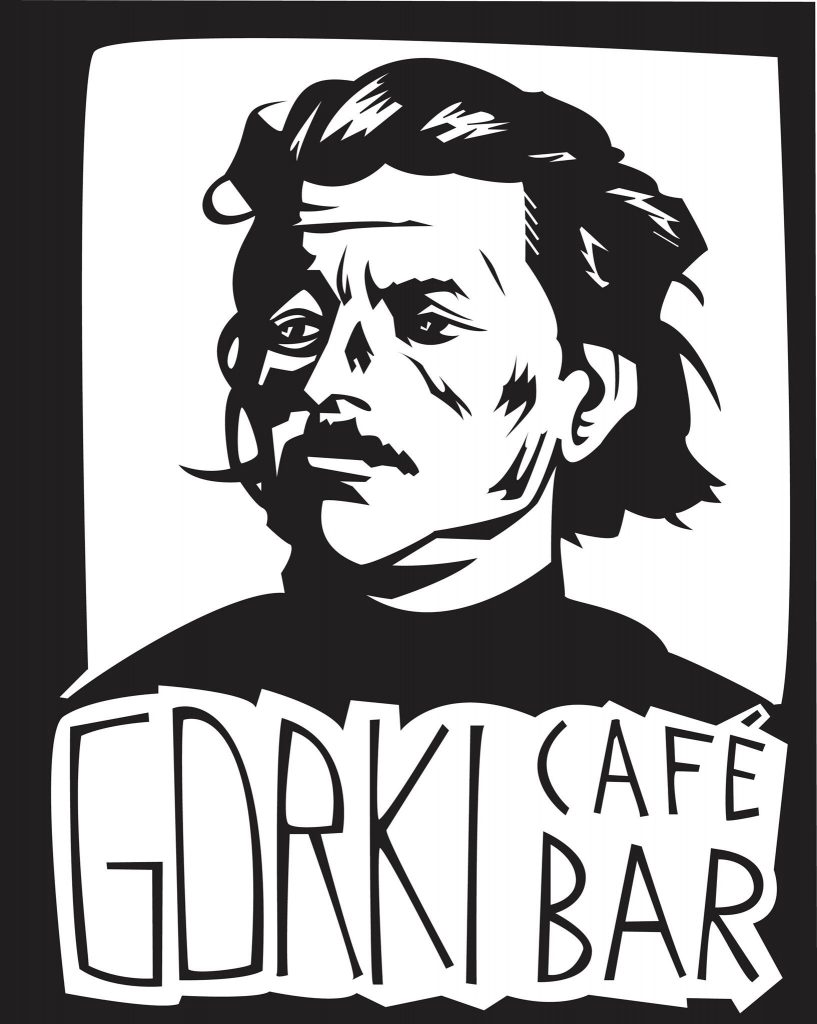
After Gorki and Kompasset were established, business expanded even further when the guys took over the reins of a third pub in Copenhagen in April 2019: the St Pauli Minibar (Halmtorvet 54, Cph V) in Vesterbro right across from the Meatpacking District. “Out of the three, I run Kompasset – that’s my child. This includes organising all the events: we have live music every Saturday, Happy Hour every Monday, pub quiz every Wednesday, and once or twice a month we have a beer, gin, rum, cider or whisky tasting, or some other event, on a Thursday.”
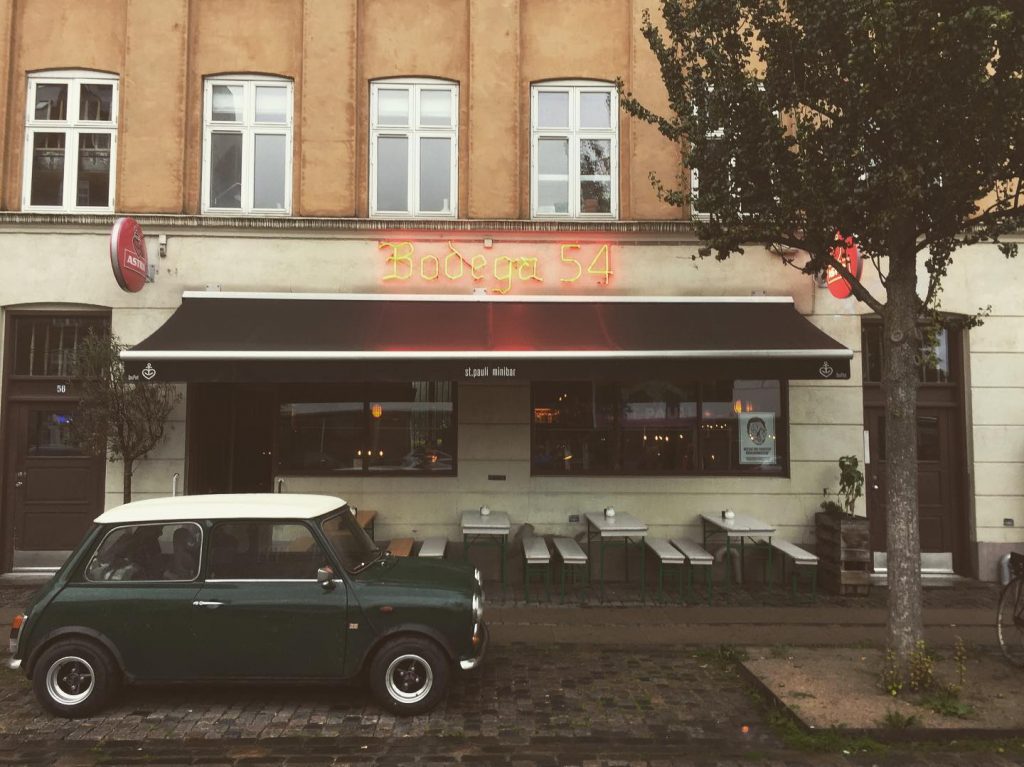
Mégiscsak Magyaros egy kicsit, na
“Do a lot of Hungarians frequent Kompasset?” I asked Balázs early on in our conversation, as he was heading back into his apartment after a morning coffee, some fresh air and some secondhand smoke from his girlfriend’s cigarette.
“Yes! Look, I’m happy that the Hungarian community in Copenhagen has embraced the pub, even though we didn’t brand the place like that. It just happened since a Hungarian kid is running this pub… but I do sell Hungarian craft beer and Unicum, and I did kind of introduce a Hungarian influence to the place by using Unicum bottles as candle holders, hanging Unicum posters and Dreher [Hungarian beer brand] posters on the walls. There’s also an old paper in the bar from November 1953 with an article about the 6-3 game in which we beat the English – I got it from my grandparents. So it wasn’t meant to be a Hungarian pub, but Hungarians appreciate these small details.”

Balázs and co have also changed the assortment of beers after acquiring Kompasset from their British predecessor: “He focused more on Danish craft beer and traditional English beer. We changed this so we import Central and Eastern European, Finnish, Estonian, Lithuanian, Polish, Hungarian, Latvian and Slovenian craft beer. Though we do still buy from Danish breweries and sell their craft beer as well. And we also purchase German, Czech and Belgian beer from Danish distributors. Andy did pub quizzes a few times but, since we figured out this was a neat way to entertain our guests and to fill the bar on a Wednesday night, we made it a weekly thing.”
“And to that you added a few Central European questions…” I said laughing.
“Of course! Of course, look, let the Western Europeans learn about it.”
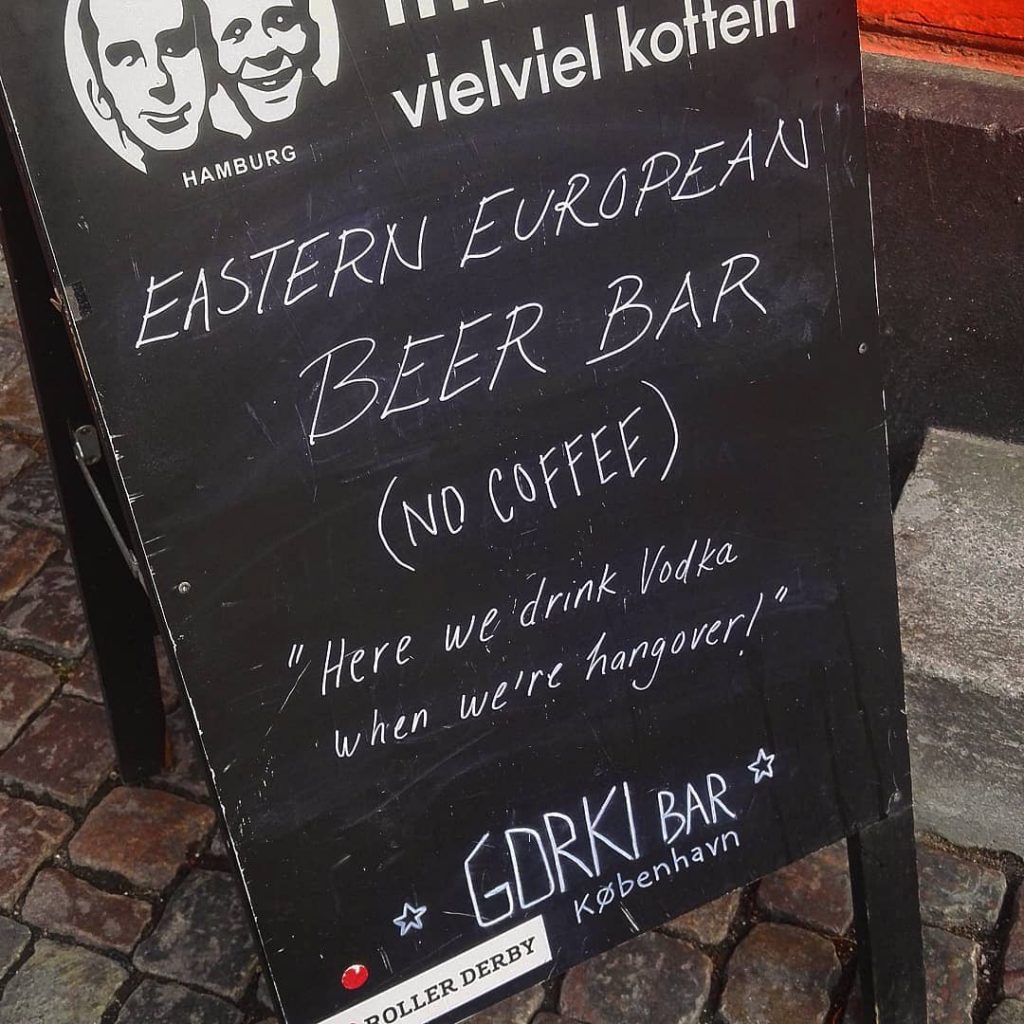
No Old Irish for us, thank you
I inquired about future business plans and Balázs told me: “We had some. But now I don’t know how long they might be postponed. We don’t know how the market will look like after the crisis. It remains to be seen. But we’d like to expand – to open a fourth bar.”
Would this be another Kompasset – is this the start of a chain that’ll eventually conquer Denmark? “No, no, no, no. We definitely don’t want to make an Old Irish chain. We have three bars and they’re all completely unique with entirely different identities, different customer bases and different high seasons. They’re all individual, independent little pubs. They each have their own soul.”
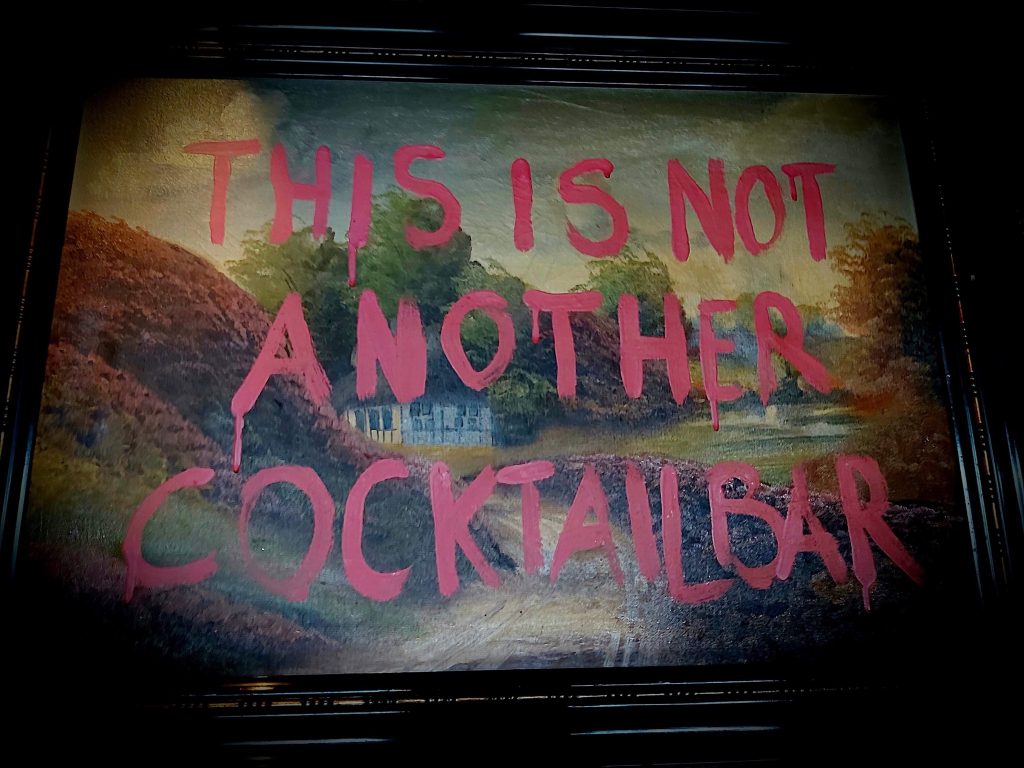
“There are a few narrow overlaps, so you’ll find craft beer in all three of our bars. But Gorki Café-Bar is openly targeting Eastern European expats with a Soviet-ish ruin pub style, while Kompasset is an Østerbro-based craft beer pub with events. And St Pauli… imagine a punk bodega, but with a civilised customer base. St Pauli is actually a district in Hamburg and a football team, so it’s influenced by that. A German, team-supporter bar that’s also a homage to the punk scene. We have a lot of German customers there, actually, because we have German drinks like Mexikaner, which is very popular over there – it’s made with vodka, tomato juice and tabasco and served in shot glasses.”
“So, these themes for your pubs – I’m assuming you guys are quite knowledgeable about them?”
“Yeah, I mean Mike is a self-proclaimed punk. In his heart of hearts, that’s what he is. And, though he is French-Canadian, he has Polish parents, a Polish passport and speaks Polish, so he’s an appropriate manager for Gorki as well.” All three bars are closed for the time being, with Gorki and St Pauli completely shut for business: zero income. They have 11 part-time employees overall – four of whom are exclusively employed at Kompasset.
Eastern European smugglers
And yes, there is more: the guys have an import business called Smuggler Imports, with which they transport craft beer from Eastern European countries to Denmark. “This is how we import some of the beer we sell in our own pubs, but we also distribute to other pubs, restaurants and cocktail bars as well. We ordered quite a lot of beer in January and February and we have a pretty nice stockpile in a warehouse in Østerbro, so it’s not like we’re running out of beer.”
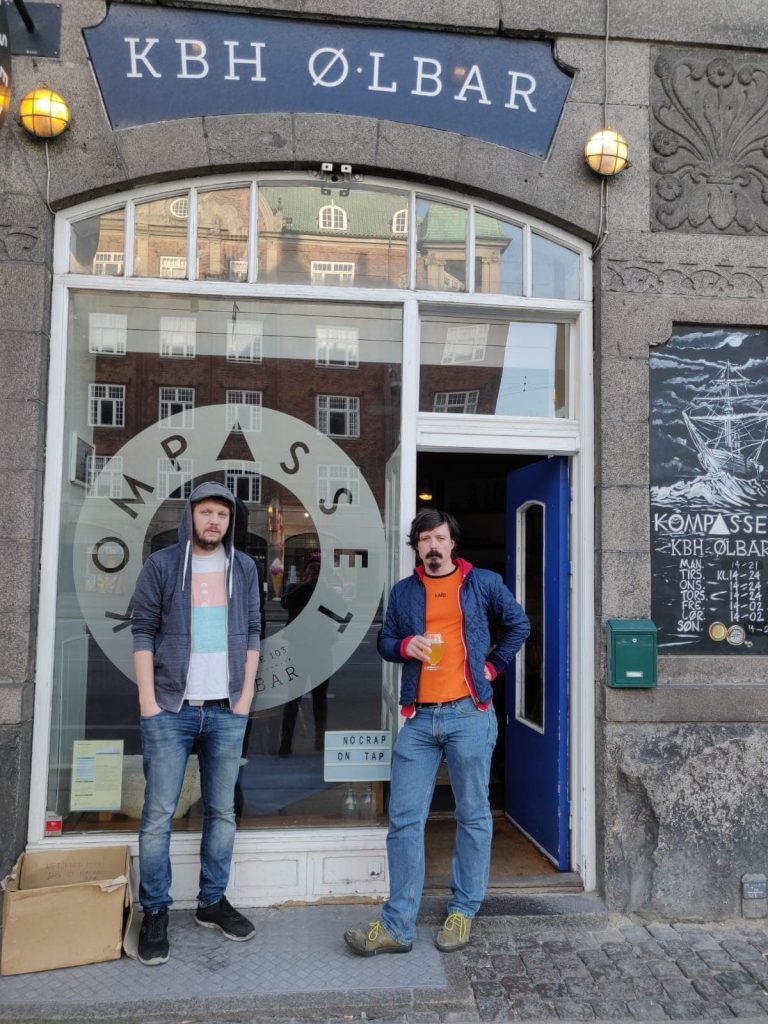
Now, in corona times, Smuggler Imports has stopped distributing to other pubs since there is no demand. “I would be very surprised if someone wrote and said ‘We’d like 40 bottles of vodka.’ I’d be like ‘oh-kay … happy to hear.’” But this is not a huge setback for the guys. The point of Smuggler isn’t so much the distribution as the fact that it allows them to secure better prices for the drinks they sell in their owns pubs: “It’s cheaper to procure the beer this way, instead of buying it from distributors on the Danish market. We basically remove a piece of the supply chain by importing the drinks ourselves. I learned this from Torben Matthews – he did the same in his pub in Kolding. And we make a small profit by distributing to others in Denmark as well – this paid for a few expenses such as the warehouse rent, but it has never been the main thing. And we still buy from Danish distributors sometimes because we’re a small company so we can’t import everything we sell.”
We don’t just drink it, we make it
But Balázs’s passion for this alcoholic beverage brewed from cereal grains reaches beyond his own businesses, beyond others’ pubs and craft beer: if you befriend the guy, you might have the privilege of tasting his own home-brewed beer sometime. “That’s my hobby – brewing beer in the kitchen. I drink this myself and give it to friends.”
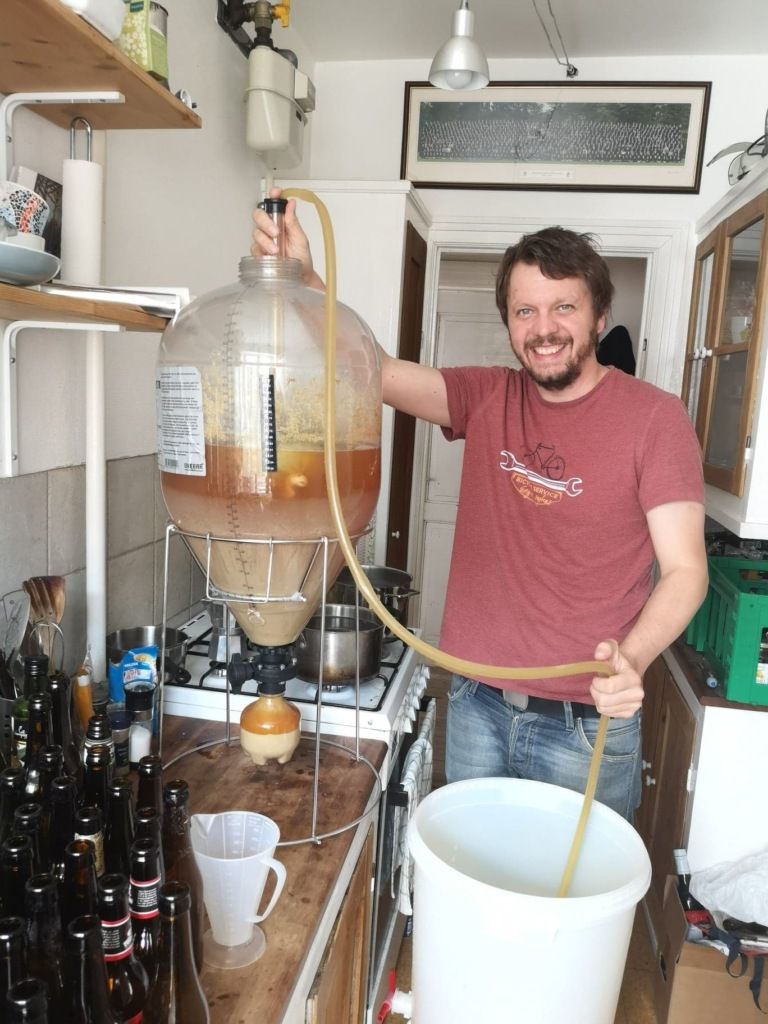
So it’s no surprise that he also endeavours, from time to time, to create his pub’s very own official craft beer: Kompasset IPA. The inspiration was a friend’s wedding and the decision to serve original draft beer, which would also be sold at Kompasset: “We brewed 500 litres of it at Åben brewery in Kolding and we sold it in our bars – we were able to do this because, unlike my kitchen, breweries have all the necessary certificates that allow them to sell commercially. We brewed a batch last July, served two barrels at the wedding and sold 13 barrels’ worth in three weeks in the three pubs, so it was quite a success. It’s a strongly hopped beer, hence the name invented by my girlfriend: ‘Hoppy Ending’.”
A true beer geek
This love of beer and bartending begs the question: what is Balázs’s favourite drink? What would he recommend to you, a thirsty guest looking to find the finest beer out there?
“Wow, well, it’s really hard to answer this question because I’m a beer geek; I really love beer. So if I’m in Prague I drink pilsner, wheat beer in Germany, strong Trappist beer in Belgium, warm flat real ale in England.”
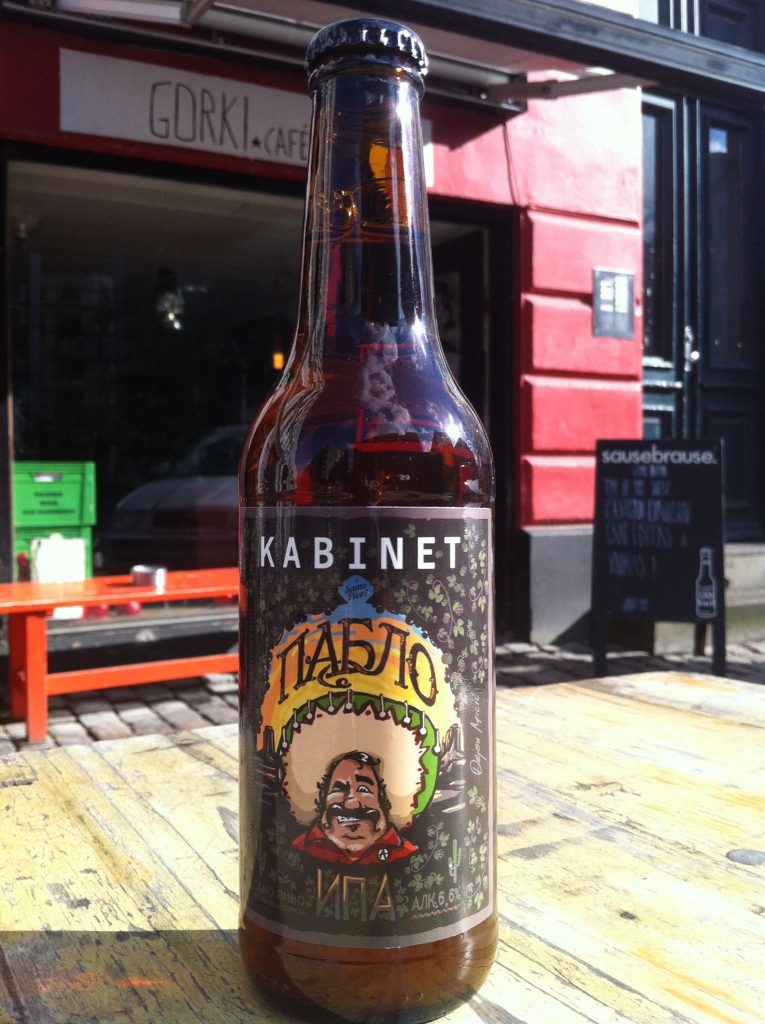
“But if you ask me what my absolute favourites are, I would say either the double dry hopped hazy IPA, or sour beers – but the thing about sour beers is that I can sell them to about two out of ten people. It has a very strong character that you really need to get used to first. They add a bacteria to the beer while brewing it and this makes it sour – lactic acid bacteria. Or the session IPA! I’ll add that to my list too. The session IPA is good because it’s always under a 5 percent alcohol level, so it’s not the end of the world if you drink three or four of these, while if you drink four pints of a Belgian Trappist beer with 8 percent alcohol content, you’re pretty done for.”
THE FUTURE:
Copenhagen or Budapest?
So, what does the future hold for Balázs? After all the travelling, it seems he has found where he belongs – for now, at least. “I fell in love with Copenhagen. I really found myself here because life is easy – the people and the government leave you be. I pay everything as I should, it’s all clean, there’s no black money paid to musicians or anything like that. And if you stick to these basic rules in Denmark, they let you work, which I really like. And I know how it is to work in Hungary in the hospitality industry and that the government basically uses you as a milking cow for its own benefits. I like living here – Copenhagen is very open, multicultural, very European.”
When I asked him whether he felt accepted by Danes, he told me: “If you work in the hospitality industry, you always find people who have an issue with your Eastern European background. But you find that in all countries, it’s not a uniquely Danish thing. Luckily, I only encounter this very rarely and 98-99 percent of the people I meet have a positive attitude to my roots – to a Hungarian guy trying to make it in the world of pubs. And they’re supportive.”
Most of his friends are internationals though, but he did make some very good Danish friends back in Kolding – “which is a much less multicultural city.”
“Are you guys still in touch with each other?”
“Not very much. But not because we had a fallout or because they turned out to be bad people. Simply because they live very different lives from mine and we grew apart. They have families, two children. I moved to Copenhagen, opened a pub. My days usually start at twelve and end at two in the morning, while theirs start at five in the morning, because of the kids, and end eight o’clock in the evening if they’re lucky.”
A life in between
Despite his criticism of Hungary, Balázs says he had a very good life over there as well. “I come from a middle-class family. I didn’t feel like I was lacking in anything and I liked living there too. That’s exactly why I visit as much as I do. But I do acknowledge its flaws.”
“If I could build a life in between – keep my business going in Denmark but spend a lot of time in Hungary as well – I would have the ideal life. So that’s my long-term plan: not leaving my roots behind completely, but also staying in Denmark to a certain extent.”
Hvad med Dansk så?
“Do you speak the language or want to learn eventually?”
“I have lived here for ten years, so it’s the minimum that I speak some Danish and I often speak Danish with the customers. But I’m not saying that my Danish is very good, I’d rather say it should be much better than it is now, but … yeah, I’m trying to integrate on this level as well. But I don’t speak Danish at the pub quizzes. We have a lot of Danish players and this is their mother tongue, so I choose a language that’s foreign for both of us. This way, I can be much more confident in my speech. But maybe it’s a problem that I’m not practising Danish with the Danes since I should be practising Danish with the Danes.”
Dad, dad, look! I just brewed an imperial black stout!
Finally, we can ask the question: will there be small editions of Balázs, kids playing bartender even before they can walk, heirs to all the knowledge of Eastern European craft beer and pub quizzes? What about dating, what about love and what about family? “I’m actually with a French girl right now. Regarding family, I would really like to start one someday. But not for the sole purpose of having children. I want to start a family because I found a person I can imagine starting a family with. This is my approach to it. So, if that’s what I’m dealt, I’d love to do it.”


